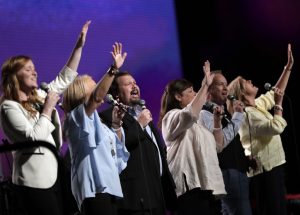
Members of the worship team sing during the Southern Baptist Convention annual meeting, Tuesday, June 13, 2017, in Phoenix.
Credit: AP Photo/Matt York
“I don’t identify myself with that term any more,” Boz Tchividjian said recently. He was talking about being “evangelical”, the movement his grandfather, the Rev Billy Graham, helped popularize in America. “Words matter,” Tchividjian said, “and ‘evangelical’ isn’t like Baptist or Episcopalian, which can be clearly defined. The minute you use that term to someone,, “you’re defined by how they interpret it.”
Tchividjian is among a growing number of religious people and groups in America who have stopped identifying as evangelicals in order to distance themselves from the more extreme elements of Christian society, while remaining true to their principles.
This fall, the 80-year-old Princeton Evangelical Fellowship dropped “evangelical”from its name. William Boyce, executive secretary of what is now the Princeton Christian Fellowship, explained the move, saying: “In recent years … we are seeing that more students either do not recognize or they misunderstand the term evangelical.”
And in […]











This is some good news!. The term “evangelical” seems to have a broad definition. I feel it is true that many non-religious people have unfairly conflated it with Christianity in general. I also feel that it is probably the Evangelicals who are trying hard to infiltrate our Democracy and this doensn’t bode well for “Separation of Church and State. Another positive trend is that America is becoming more secular, and spirituality is becoming more an individual faith and subsequently, less dogmatic.